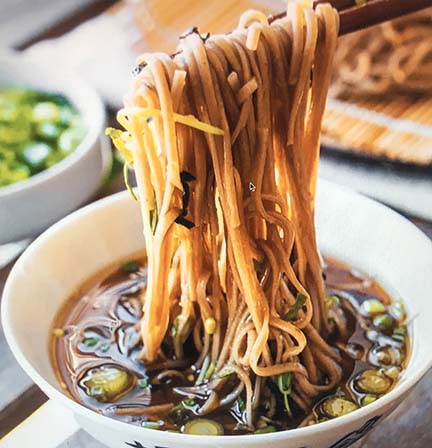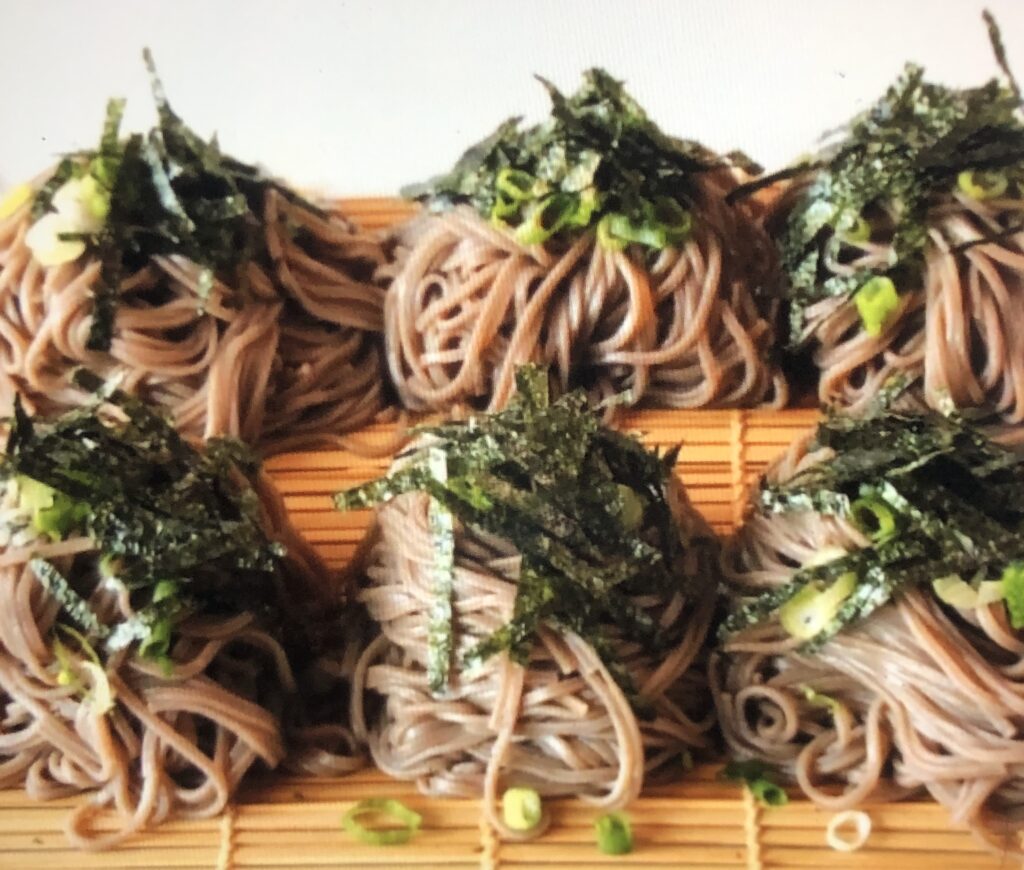
This is a simple and favorite summer dish that is Japanese in origin, but also found in Korean kitchens. It is an icy cold way to serve wheat and buckwheat (soba) noodles. The Japanese way of serving the noodles is on a special bamboo mat that you see in the photo. You can buy the tsuyu sauce but it will probably contain dried bonito flakes, making it non-vegetarian. The tsuyu recipe is enough for many servings of noodles or other uses.
Tsuyu Sauce
1 cup soy sauce (dark soy sauce will provide a richer flavor than light soy sauce)
1 cup mirin
½ cup sake or more mirin
1 piece kombu (kelp)
⅓ cup katsuobushi (dried bonita flakes) or substitute shiitake mushrooms to make this recipe vegan
Noodles
14 ounces soba noodles
Garnishes
Finely grated or minced ginger
1 Tablespoon wasabi sauce (from a tube or paste made from wasabi powder)
2 ounces peeled, grated daikon or Korean radish
3 finely chopped scallions
1 sheet of nori (seaweed paper)
toasted sesame seeds
Prepare Tsuyu Sauce (or buy at Asian market)
Combine soy sauce, mirin, sake, kombu, and katsuobushi or dried mushrooms in a large saucepan. Adjust the stove to medium-high heat and bring the stock to a boil. Once it’s reached a boil, reduce the heat to low and let the tsuyu simmer for 5–7 minutes. The soup base should thicken slightly. Remove the pan from the heat and strain the sauce using a fine mesh strainer to remove the kombu and katsuobushi. Let the tsuyu sauce cool before using it in other recipes or storing it in the refrigerator. The tsuyu will stay fresh for a week in an airtight container in the refrigerator or freeze it as ice cubes. This makes about 2 1/2 cups sauce.
Combine 1/2 cup tsuyu sauce and 1/2 cup cold water in a small bowl. Stir it to mix well. Set aside.
Prepare Garnishes
If not using tubed wasabi, combine 2 teaspoons wasabi powder and 2 teaspoons water
in a small bowl. Mix well and cover. Set aside. It is important to not expose it to air. You can mix it in a small shot glass and invert the glass and then serve it in that glass.
Grate the daikon and transfer to a strainer over a bowl. Set aside.
Toast both sides of the seaweed paper until it’s very crunchy. Shred thinly with kitchen scissors, and keep it in a plastic bag to keep it from getting soggy. Set aside
Combine 1/2 cup tsuyu sauce and 1/2 cup cold water in a small pitcher. Stir it to mix well. Set aside in fridge.
Prepare Noodles
Bring a pot of water to a boil and add the noodles. Stir them with a wooden spoon to prevent them from sticking to each other. Cover and cook for 6 to 7 minutes over medium high heat. If it boils over, crack the lid a bit or keep it off. Take a sample of the noodles and taste it. If it’s cooked nicely, remove from the heat. If it’s still a little uncooked, cook 1 or 2 minutes longer. Drain the noodles through a strainer. Rinse them under cold running water, rubbing with both hands until the noodles get cold and not slippery anymore. As a final step, fill a large bowl with cold water with some ice cubes, to make the noodles very cold and chewier. 2-3 servings.

Drain and make 6 equal size bundles. Place them on a bamboo mat on a large platter. Sprinkle Nori and onions on top of bundles.
Serve
Provide the garnishes for each person or keep in individual bowls as a buffet of garnish options along with a pitcher of sauce. You may also have a bowl of ice cubes to add to the dipping sauce. Give everyone a plate and a small bowl for the sauce and let them add the garnishes they want.
Take a bundle of the noodles with chopsticks and transfer to an individual plate. Take some noodles, dip them into the sauce, and eat. When the bundle on your plate is done, take another. If you find the melting ice has diluted the dipping sauce, you can add some more tsuyu sauce if you want.
Once your noodles are done, you can drink the sauce! Enjoy the cold noodles!





Add comment